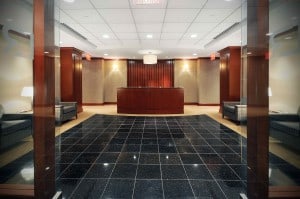Learn the 3 reasons behind a solo attorney’s preference for shared office space.
What is shared office space?
Shared office space is a fully equipped and move-in ready office environment that provides solo attorneys and small law firms a real estate option other than working from their home or signing a direct to landlord lease.
3 Reasons Why Solo Attorneys Prefer Shared Office Space
- Economics

Shared office space offers economic benefits with respect to office amenities as well. When you share office space with other like-minded professionals, attorneys can leverage office costs among the group.
For example, it may be cost prohibitive for a solo attorney to employ a full-time receptionist with an average salary of $32,000 a year. However, the cost becomes more manageable when spread across 10 solo attorneys sharing the same office space. The same holds true for professional grade business machines, like copy equipment, postage machines, telephone servers and professional grade Internet.
In most shared office spaces, including sublets and executive office spaces, these amenities are already supplied and priced into your monthly rent payment, saving the solo attorney or small law firm the time required to coordinate and set up the office equipment, hire a receptionist, and pay for each of their ongoing cost.
2. Collaborative Opportunities

For example, in a B-to-C practice such as immigration, attorneys often have practice area questions that arise involving other consumer based areas of the law, such as family law, criminal defense and employment. Immigration attorneys often have immigration based questions, as the practice is extremely specialized.
In shared office space, the immigration attorney can ask colleagues to sit-in on meetings or co-counsel on practice areas they are unfamiliar with. Shared office space aids in providing more competent client representation and gives the illusion that the immigration attorney is much larger than a one-man army.
The same can be said for a business to business practices as well. For example corporate transactional attorneys often have ancillary issues that involve IP and employment law from the management side.
3. Referral Possibilities

In effect, lawyers who choose a shared office space transform their monthly rent from a fixed expense to a potential profit center. This adds significant economic value to the firm’s bottom line.
The most important part of sharing office space with other attorneys is finding the practice area mix. For example, while a personal injury attorney can certainly co-exist with a bunch of tax or patent lawyers, the better fit from a business development perspective would be a suite with immigration, workers’ comp and matrimonial attorneys.
If a shared office space only has a limited number of offices, an attorney would want to make sure that some of the other attorneys practice in complementary areas of the law that will have the most potential for referral exchange.
Being selective about practice niches is less of a concern in larger shared law office suite with many attorneys from diverse practice areas. For example, in a shared office space like Law Firm Suites, where over 125 attorneys in different practice areas share space, there will always be an opportunity to build a referral connection.


